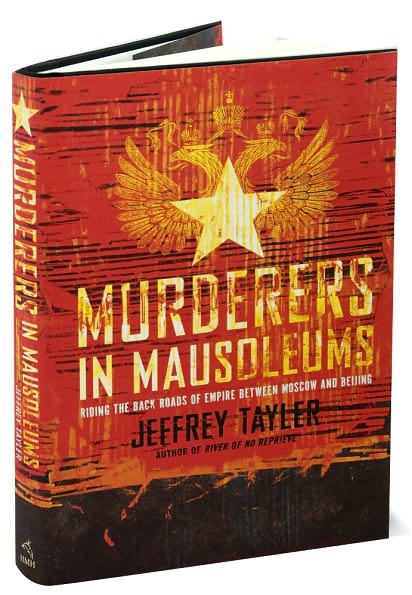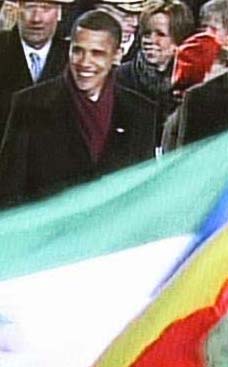
Many of his subjects in Kazakhstan and Kyrgyzstan wax nostalgic about the former Soviet Union — pining for the order and relative prosperity that came along with subjugation. Modern-day Mongolians and Chinese extol the virtues and ignore the crimes of their historical leaders Genghis Khan and Mao Zedong. Some of the people he encounters seem genuinely confused by his identification with nationality instead of ethnicity. In Kabardino-Balkaria, for instance, a mostly Muslim Russian republic with an uneasy mix of ethnicities, one interlocutor presses him hard when Tayler tells him he's American: "No. What's your blood?" Jeffrey Tayler served as a Peace Corps Volunteer in Morocco. He has published numerous articles in Atlantic Monthly, Spin, Harper's and Condé Nast Traveler and is a regular commentator on NPR's "All Things Considered.
"Murderers in Mausoleums" is travel writer Jeffrey Tayler's engrossing story of his grueling 7,200-mile journey from Moscow's Red Square to Beijing's Tiananmen Square, chronicling the region's brutal history and its current story through the eyes of ordinary folks, from taxi drivers to bus passengers to museum guides to barflies
A long, raucous, grimy journey as told by Central Asia's locals
"Murderers in Mausoleums" is travel writer Jeffrey Tayler's engrossing story of his grueling 7,200-mile journey from Moscow's Red Square to Beijing's Tiananmen Square, chronicling the region's brutal history and its current story through the eyes of ordinary folks, from taxi drivers to bus passengers to museum guides to barflies.
By by David Takami
"Murderers in Mausoleums: Riding the Back Roads of Empire Between Moscow and Beijing"
By Jeffrey Tayler
Houghton Mifflin/Harcourt, 320 pp., $24
Jeffrey Tayler specializes in reporting on some of the most remote and forbidding destinations on earth. Call it the X Games of travel writing.
His previous books have taken us to places we'll likely never go: Siberia, the Congo, and sub-Saharan West Africa. In his latest work, the brilliant and engrossing "Murderers in Mausoleums," Tayler undertakes a grueling 7,200-mile journey from Moscow's Red Square to Tiananmen Square in Beijing, crossing southwestern Russia and the Central Asian nations of Kazakhstan and Kyrgyzstan, then traversing the northern edge of China and a section of the famed Silk Road trade route.
Far from political and cultural centers, Tayler visits grimy, industrialized cities and lifeless landscapes, among them Makhachkala on the Caspian Sea, a wild town roiling with ethnic tensions and widespread drunkenness; the Karaganda Correctional Labor Camp in central Kazakhstan, where 2 million people were once exiled by Soviet authorities; the western end of China's Great Wall; and a Mongolian Buddhist monastery.
The book's title alludes to the storied history of the region, once the domain of ruthless conquerors who killed millions in their quest for "unity" and control of huge territories. Genghis Khan ruled the Mongol Empire in the 13th century, and more recently, Communist dictators Lenin, Stalin and Mao led powerful regimes. The author rises to the challenge of history-telling on an immense scale by blending big-picture overviews with vivid local histories, replete with their own variations of invasions, marauding, and ethnic rivalries.
Tayler is the perfect companion on this trip: a knowledgeable and opinionated guide who happens to speak eight languages. He also has a noteworthy stamina for drinking and clubbing — which is key to his access to local residents.
His writing is lyrical, evoking culture and history through often startling imagery. Of a car ride across Kazakhstan's desolate Betpaqdala Desert he observes: "Within an hour we were shooting across sun-cauterized wastes the color of cigarette ash, scarred with salt patches, spiked with camel bones, with sticks and rock shards and prickly shrubs." He describes riding in a taxi in northwestern China "beneath wind-lashed red and white political banners, past blocky modern apartment buildings standing stark on gravel lots, almost unreal in the auroral half-light, the sfumato of a dream."
Tayler's narration is often personal, but never intrusively so. He mostly tells stories through the voices of people he meets, some by arrangement, some by chance. He wisely avoids talking to leaders and officials, preferring to seek out ordinary folks, from taxi drivers to bus passengers to museum guides to barflies.
Their opinions are not always reality-based, but they are vibrant and heartfelt. Many of his subjects in Kazakhstan and Kyrgyzstan wax nostalgic about the former Soviet Union — pining for the order and relative prosperity that came along with subjugation. Modern-day Mongolians and Chinese extol the virtues and ignore the crimes of their historical leaders Genghis Khan and Mao Zedong. Some of the people he encounters seem genuinely confused by his identification with nationality instead of ethnicity. In Kabardino-Balkaria, for instance, a mostly Muslim Russian republic with an uneasy mix of ethnicities, one interlocutor presses him hard when Tayler tells him he's American: "No. What's your blood?"
Because of the hassles and hardships and acute loneliness that comes from several months of such traveling, this kind of writing seems more like compulsion than vocation for Tayler, and it creates a similar obsession for the reader. Yes, we've been taken on an impossibly long and sometime raucous journey through many lands — yet we don't want the adventure to end.
David Takami is the author of "Divided Destiny: A History of Japanese Americans in Seattle."













